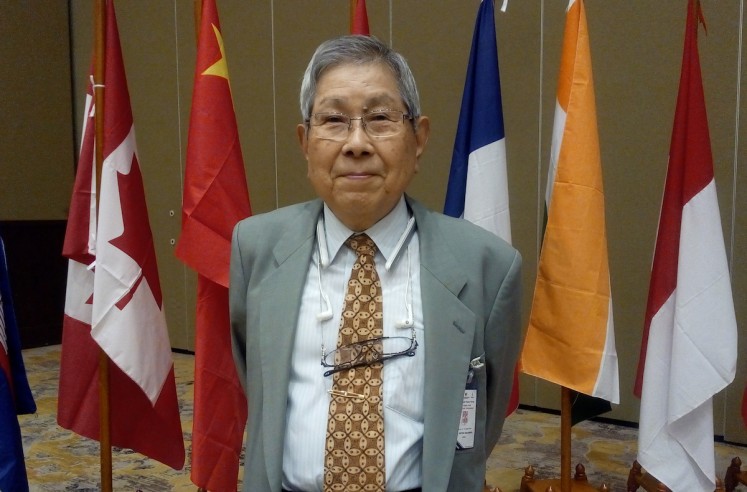Liza Yosephine
The Jakarta Post
Jakarta
Jakarta, posted: Tue, August 21, 2018 |04:08 pm

Mitsuo Nakamura attends the World Peace Forum.(JP/Sausan Atika Maesara)
Indonesia recently hosted the seventh World Peace Forum, which discussed the middle path approach for the new world civilization. The Jakarta Post's Liza Yosephine and Sausan Atika Maesara spoke on the sidelines of the event with professor emeritus of anthropology at Chiba University in Japan, Mitsuo Nakamura, who participated in the biennial forum in Jakarta. He specializes in the study of Islamic social movements in Indonesia. Below are excerpts of the interview.
Question: What is your view on the middle path for the new world for civilization?
Answer: According to my understanding, the middle path is an effort to attain a goal, which means a process to pursue solutions in conflict situations.
In conflict situations, you have extremes, pros and cons. You have to overcome the conflict in order to keep the peace and stability of the community. In that case, you have to attain the goal of the middle path, which is not [necessarily] to compromise but to understand each other's differences and come to a common understanding that we must agree to disagree to some extent, acknowledging differences and commonalities. I think that is what is meant by the middle path.
What are other steps that can be taken to move forward in order to reach the goal of the middle path?
I believe the most important thing is to engage in dialogue, talking to each other in a calm situation, thinking rationally without inciting emotions and acknowledging differences. The point is to agree to disagree. That is the philosophy of attaining the middle path.
What do you think about rising extremism, intolerance and what should be done to tackle it?
Basically, what you need to do is create a platform in which the parties in conflict can get together, have a face-to-face, engaging calm and rational dialogue. That is the most important thing. I think civil society organizations, as well as the government, should provide such a platform for dialogue. This World Peace Forum is one of the most important places [to accommodate that].
What are some of the key things that should be highlighted by the World Peace Forum?
This time, I believe that the Indonesian government and all of the organizers of the World Peace Forum are taking the initiative to hold an international dialogue like this, seeing the world and the mass situations.
Things are not too hopeful. I believe that in many parts of the world, the situation, of which religion, culture, ethnicity and conflict, has grown to the worst tendency.
The initiative taken to hold a World Peace Forum is very valuable to address the real situation that is happening in the world nowadays. The participants of this forum are really eager to engage in dialogue.
What are some of the lessons that Indonesia can learn from Japan in terms of creating peace?
From Japan, [I'm not sure if] this is a lesson or not, but one thing I'm quite sure of is that after the defeat of Japan in World War II, Japan made a very decisive decision to separate religion from government.
Before World War II, Japanese militarism utilized Japanese religion, especially the religion of Shinto, to promote the war effort, justify the goal of the war and so forth.
So, Japanese people were unable to face the freedom of Shintoism applied from above, by the government. Christianity and Buddhism were kind of pushed down by Shintoism. From that bitter experience, the Japanese constitution made it clear that religion should be separated from politics.
Because of that, religious freedom in Japan is well-developed. Without making any political conflict, we, the Japanese, are now free to choose any religion. I think that’s the fruit that Japanese people acquired at the price of the defeat of the war. I think that was the most important experience for Japan.
http://www.thejakartapost.com/amp/news/2018/08/21/to-ensure-peace-japan-separates-religion-from-politics.html

No comments:
Post a Comment